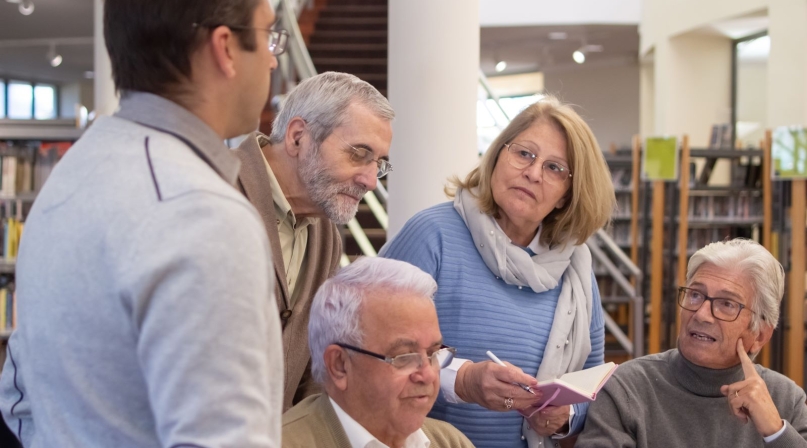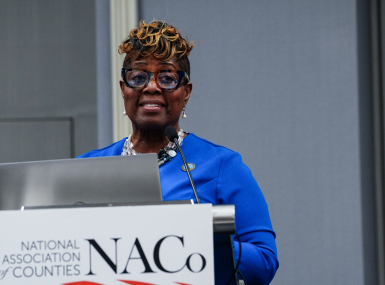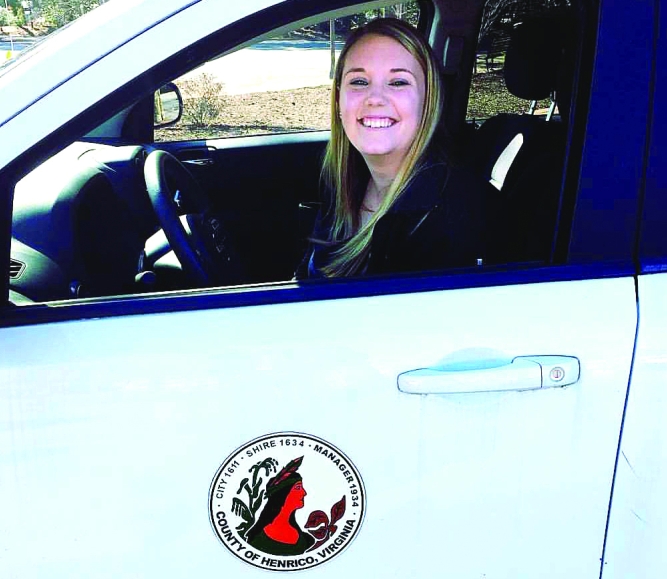County libraries launch ‘memory cafés’ for aging Baby Boomers

Key Takeaways
Baby Boomers are getting older – one in six people in the United States is 65 or older – and one in eight report worsening memory loss, according to the Centers for Disease Control and Prevention.
To promote socialization and help combat memory loss, libraries in Douglas County, Wis. and Cook County, Ill. are hosting “memory cafés” to create a sense of community for both those experiencing memory concern and their caregivers.
Avis Hanson, an 83-year-old Douglas County resident, visits the Superior Public Library memory café with her husband Richard who has Parkinson’s disease. The couple recently moved back to Douglas County due to health reasons and the library’s new programming has not only been beneficial for helping Richard’s memory, but also a great way to socialize and meet other people dealing with similar struggles, Hanson said.
“[Richard] can get around, he can do everything himself, he’s just slower because Parkinson’s ages you so fast and his memory isn’t what it used to be,” Hanson said. “And that’s the hard thing for both of us, because he was a college professor for 30 years and an elementary teacher and it just breaks his and my heart that he isn’t as sharp as he used to be, so anything we can do to reconnect with people and keep talking about lots of stuff is good for the brain.”
The library teamed up with Douglas County’s Aging and Disability Resource Center to create the programming, which includes games intended to jog memories as well as activities like decorating pumpkins and painting canvases.
Leslie Mehle, Superior Public Library’s manager of library programs and partnerships, said she thinks libraries are a great place to cater to people struggling with memory loss, because it can encourage them to get involved in other library services, like its book club geared to seniors and its collaboration with AARP on tax help for aging adults. Such programs also reduce the stigma associated with experiencing memory loss or confusion.
“That’s just a big segment of the population and it’s not like issues of memory loss are going to improve, I think we’re going to be seeing more of it,” Mehle said. “I think that having a memory café at the library, which is everybody’s space, it’s public and everyone is welcome. I hope that that will sort of work to destigmatize it, at least in our immediate community.
“... Instead of being ashamed of their experience or feeling like, ‘No one understands what I’m going through, I’m alone,’ this can hopefully help with some of that isolation and that frustration, as we sort of build a community of people who are experiencing the same thing.”
Douglas County’s first memory café, which launched in September, consisted of a retired local librarian and historian giving a presentation with photographs of the county seat dating back to the 1940s.
“A lot of our participants were growing up then or remember those times, so they really enjoyed it,” Mehle said. “She talked about a couple of the old theaters, old hotels, the dime stores, the candy shops, just a lot of places that people would remember. One of our participants was like, ‘My mom worked at that department store for 60 years!’ and it really brought a lot of conversation about the past and the things that they remember growing up.”
Hanson said it was “magnificent,” and that she’s looking forward to continuing to attend the library’s memory cafés with her husband.
“All of these old pictures of Superior from way back, some of them were very familiar to us because we lived here for 30 years before,” Hanson said. “The program was amazing. There were people there who we visited back and forth with and the pictures … like how you would play a memory game with children to get people’s memories going and what a discussion we had over those — it was like a mixer.”
The nonprofit AgeOptions, which connects older adults with care and resources, works with local partners to create memory cafés — two of which are located at libraries in Cook County, Ill. The Evanston Public Library group meets in-person monthly, with activities including chair yoga, watercolor painting and dancing, and virtually on a weekly basis for brain games and virtual museum visits. A new memory café recently launched at Park Forest Public Library, which meets monthly for two hours.
“The memory cafés are stigma-free social settings for people living with dementia and their care partners to meet, enjoy time together and really have that socialization and ability to be outside of their home and connecting with others,” said Cristina Diaz, who manages AgeOptions’ memory café program.
AgeOptions also has Caregiver Resource Centers and engages nontraditional partners, with the aim of “targeting cultural and logistically isolated persons,” through offering memory café programming in multiple languages, including Spanish, Chinese and Hindi, according to Diaz.
The programming is tailored to each community, but activities include music therapy and poetry.
“We’ve always received wonderful feedback, really warm and responsive, from the memory cafés and the activities they have,” Diaz said. “We’ve been very intentional in allowing that individuality and ownership from either the partners or agencies to really make it their own and respond to their community.”
The nonprofit also partners with 40 Cook County libraries on its Library CARES Program, which aims to reduce social isolation among the elderly.
Cook County libraries can launch their own version of a memory café, but can’t receive funding for both the memory café and Library CARES Program through AgeOptions, according to Laona Fleischer, AgeOptions’ special initiatives program specialist.
A National Library of Medicine study found that memory cafés “offer important benefits for families living with dementia” and that the ability to offer them virtually as well can increase social connectedness for those living in geographically marginalized and underserved areas.
“Dementia can move at a very slow pace, or it can be someone with early onset, and they’re going to move quickly through, but to find opportunities for both to stay connected [is the goal],” Fleischer said.
“There’s been a lot of research done that if folks stay involved — if they read, they talk, they interact with people, it’ll encourage them. It doesn’t slow down dementia, but it can increase their quality of life.”
Related News

National Association of Counties Launches Initiative to Strengthen County Human Services Systems
The National Association of Counties (NACo) announces the launch of the Transforming Human Services Initiative, a new effort to help counties modernize benefits administration, integrate service delivery systems and strengthen county capacity to fulfill our responsibility as America’s safety net for children and families.

Congress seeking ‘common-sense solutions’ to unmet mental health needs
Rep. Andrea Salinas (D-Ore.): “Right now, it is too difficult to access providers … and get mental health care in a facility that is the right size and also the appropriate acuity level to meet patients’ needs.”

Prince William County transforms crisis care through "No Wrong Door" approach
Prince William County, Va.’s Crisis Receiving Center is bridging the gap between emergency room care and traditional outpatient care in behavioral crisis response and reducing burden on local law enforcement and hospitals.
County News
Advocate for the aging gives voice to older adults

